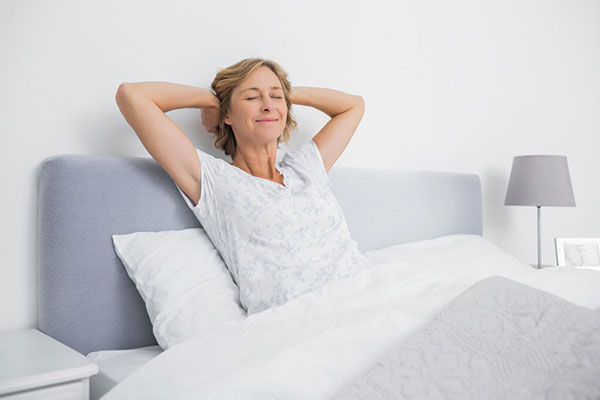When Sleep Eludes You
Getting a Good Night’s Rest While Coping with Cancer
by Carol A. Enderlin, PhD, RN, FNGNA, Martha Kuhlmann, DNP, RN, PMHCNS-BC, FNP, APRN, and Ellyn Matthews, PhD, RNn, CBSM, FAAN
Sleep is essential for our bodies to restore our energy and recharge to keep us going. Seldom is sleep more important than when coping with cancer, its treatment, and survivorship. Yet sleep is so connected to how we feel physically and mentally that cancer-related stress can often disturb our sleep quality and patterns. Getting a good night’s sleep may be most elusive when we need it the most.
Sleep Basics
Understanding how sleep works can give you insight into how to improve your sleep while coping with cancer. One of the ways we balance sleep and wakefulness is through the buildup of sleep pressure that occurs the longer we are awake. Sleep pressure is at its lowest after a full night’s sleep when our sleep needs are met.
If sleep is too short or is disturbed by many awakenings, we don’t get the deep, restorative sleep we need. This may lead you to take daytime naps to make up for poor nighttime sleep. However, if naps are too long or late in the evening, they may interfere with the normal “pressure” to sleep at night. Sleeping too much during the day may cause your days and nights to get mixed up. If you do need a nap, both the American Academy of Sleep Medicine and the National Sleep Foundation recommend taking short naps of about 30 minutes and avoiding naps too close to bedtime, so as not to interfere with nighttime sleep.
Light exposure is also important for good sleep patterns. Sunlight stimulates the daily production of melatonin, a hormone which peaks at bedtime and helps us fall asleep. If you stay indoors all day, you may not get the sunlight your body needs to sleep well at night. Taking a short walk during the day can help you sleep better at night.
Good Sleep Habits
One of the most important sleep habits is having a regular sleep pattern – even after a poor night’s sleep. Keeping a set bedtime and wake time helps your body know when to get ready for sleep and when to wake up. A regular sleep schedule can improve restful nighttime sleep and lessen daytime sleepiness. Moreover, reserving the bedroom for sleep and sex can help you become conditioned to fall asleep when in the bedroom. Activities like watching television or using your computer or cell phone in bed can condition you to stay awake.
One of the most important sleep habits is having a regular sleep pattern – even after a poor night’s sleep.
Soothing routines, like taking a warm shower before bedtime, can help signal you to wind down for the day. Warm showers promote sleep by helping your muscles relax and decreasing your body temperature. Calming scents, such as lavender, may also promote sleep by reducing anxiety and helping you relax.
In addition, just as exposure to sunlight during the day improves nighttime sleep, keeping your bedroom dark at night is better for sleeping. Light-blocking window coverings in sleeping areas are helpful. Conversely, television, computer, and cell phone screens project very bright light, which interferes with deep sleep, and need to be turned off at night, or located out of view of the bedroom. Environmental noise may also interfere with falling asleep or reaching deep sleep. Using background noise from a sound machine, air purifier, or fan may block out unwanted sound. You can also try sleep masks and earplugs to lessen nighttime light and noise.
Worry or difficulty turning off your mind at bedtime may delay sleep. Using simple relaxation methods like slow, deep breathing, prayer or meditation, and music or guided imagery may help you relax and focus on more positive thoughts. Early in the day, set aside time to deal with demanding tasks, and avoid having emotionally charged conversations at bedtime.
Regular exercise early in the day promotes sleep. However, exercise, as well as nicotine and caffeine, should be avoided at least three hours before bedtime to prevent stimulation of wakefulness. Heavy or spicy meals, excessive fluids, and alcohol should also be avoided too close to bedtime. While alcohol may initially cause drowsiness, it results in early morning restlessness and awakening.
Lastly, many pets are like members of the family, but they may not share the same sleep-wake patterns as humans. Cats are nocturnal by nature, sleeping during the day and becoming active at night. And while dogs may adopt their owners’ sleep routines, they also may awaken often at night to bark at environmental noise. Sleeping separately from pets may help improve your sleep.
Sleep Management
Sleep disorders may be present before a diagnosis of cancer, or may develop or worsen during treatment. It’s important to talk with your healthcare provider right away if you are experiencing any nighttime snoring or gasping, daytime sleepiness that interferes with daily function, or uncomfortable leg sensations that worsen when sitting or lying down. You should also tell your doctor if you have difficulty falling asleep or staying asleep, or if you often awaken too early, especially if it interferes with daytime function or activities. Your doctor may prescribe medication to help treat any new or short-term sleep-related symptoms. He or she may also refer you to a sleep medicine specialist for further evaluation and long-term treatments, such as cognitive behavioral therapy for insomnia.
Developing good sleep habits is important for cancer survivors. A good night’s sleep can help you stay healthier and cope well with cancer.

Dr. Carol Enderlin (left) is a clinical assistant professor of Nursing at the University of Arkansas for Medical Sciences College of Nursing in Little Rock, AR. Her areas of interest are sleep in older adults with cancer and evidence-based practice in nursing care.

Dr. Martha Kuhlmann (right) is a nurse practitioner in the General Mental Health Service at the Atlanta Department of Veterans Affairs in Atlanta, GA. Her areas of interest are veterans’ insomnia and treatment preferences for anxiety and insomnia.

Dr. Ellyn Matthews (left below) is an associate professor and Elizabeth Stanley Cooper Endowed Chair of Oncology Nursing at the University of Arkansas for Medical Sciences College of Nursing. Her research focus is sleep in cancer survivors.
This article was published in Coping® with Cancer magazine, November/December 2016.


